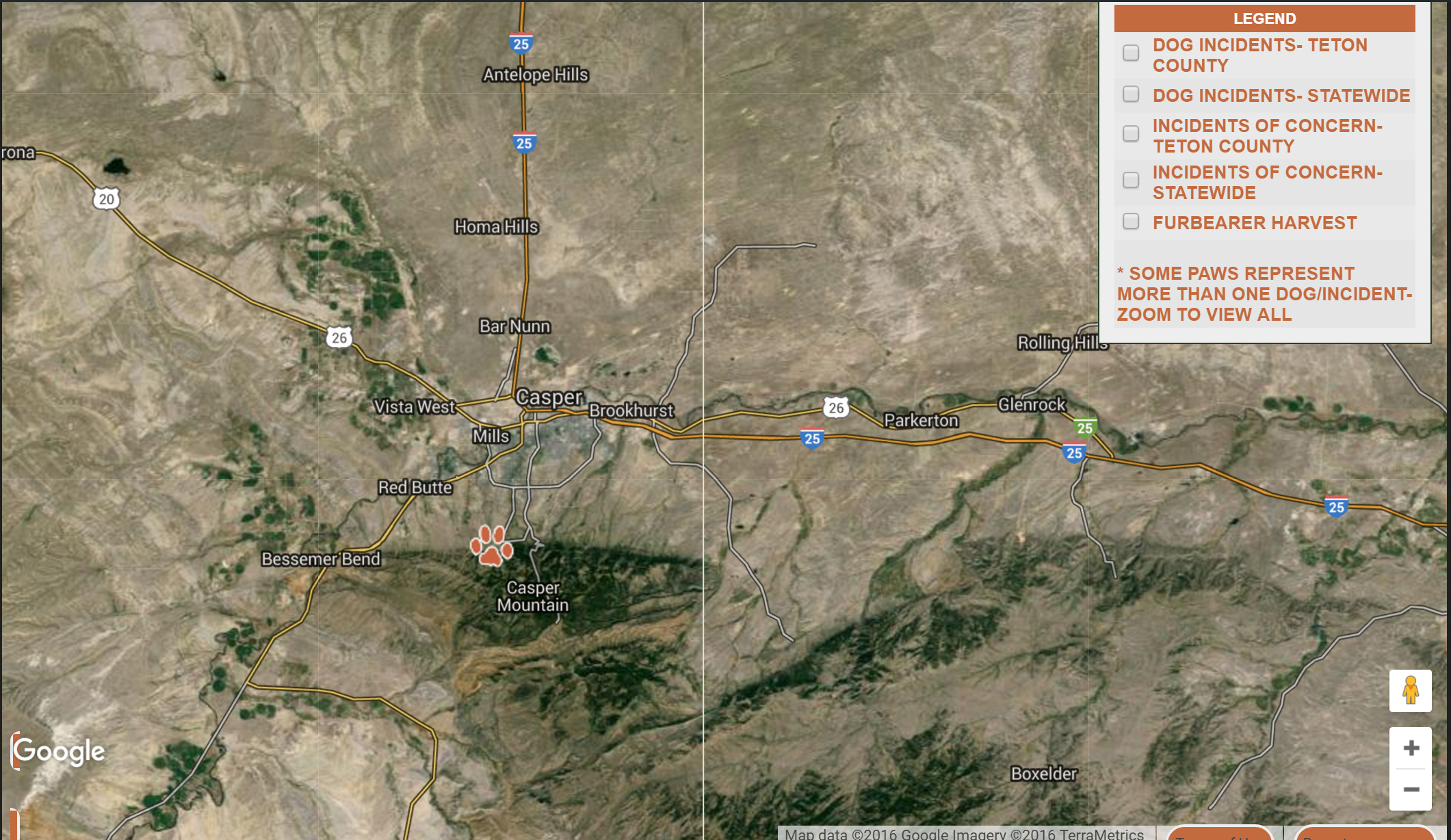Filed: Notice of Claim – Dog Killing Traps Not Legal
Wyoming Untrapped received news that a Notice of Claim has been filed in the deaths of three St. Bernards in Casper, WY on November 2014. The tragic loss of the Cardenas family’s St. Bernards, Jax, Barkley and Brooklyn sparked a great deal of controversy state wide.
Claimants assert that the traps which killed Brooklyn, Barkley and Jax were not “legal”.
In late November 2014, three St. Bernard dogs, treasured members of the Robert and Ashley Cardenas family, went on one of their customary walkabouts in the fields surrounding their hilltop home on the outskirts of Casper, Wyoming. One of the pets, Brooklyn never returned home. Thus began what was to become a frantic four-day search involving Robert, Ashley, their son Braylon and daughter Savannah along with neighbors, Metro Animal, the Casper Police Department and the Natrona County Sheriff’s Department.
What the Cardenas family did not know was that an unidentified trapper had set multiple snares on the State Land near their home. Brooklyn had been caught in one of the snares. It entangled her snout and evidence told of a long, agonizing death. It took searchers four days to find her body. But even worse, on the fourth day of the search, Barkley and Jax, the two survivors of the walkabout clan joined in the search for their buddy. Barkley, running ahead of the family members entered a draw and disappeared from sight. When he didn’t return when called, Savannah and Braylon went into the draw only to find Barkley with a wire snare locked tight around his neck. No amount of effort could release him from the deadly choke hold. His neck was broken, apparently from the force of running into the snare. Barkley died in the arms of Braylon and Savannah.
But the nightmare did not end with Barkley’s death. In less than an hour Jax, the last of the St. Bernard threesome became entangled in yet another snare. Again, the children could not free the steel wire encircling his neck. Like Barkley, Jax died in the caring arms of the Cardenas siblings. And a short while later, the body of Brooklyn was finally found by a neighbor.
Brooklyn, the first to die in a snare, was the last to be found. In less than four days, the three beautiful family pets died in three choking snares set by an unknown trapper on State Lands- public lands.
READ ARTICLE POSTED ON OUR BLOG NOVEMBER 29, 2014
The incident was first investigated by the Natrona County Sheriff’s Department, which then referred the case to the Wyoming Game and Fish Department- the agency with legal authority over trapping in the state.
Their investigation noted that the snare that killed Brooklyn was not tagged with an owner identification number as required by State Statute (the others apparently were). State Statute states that the name of the owner of legally set traps or snares cannot be made public. To this day, the Cardenas family does not know the identity of the trapper, even though one of the snares is acknowledged to have been illegal.
Nowhere in the Game and Fish report is it mentioned that measurements were taken of the snares’ loop sizes, which by Statute cannot exceed 12 inches. Anyone familiar with St. Bernards knows how large an adult male’s head can be and how unlikely it is that it could slip through a loop 12 inches or smaller, particularly if running. Was the snare of legal size? No one knows, or is willing to share that information.
Nowhere in their report is it noted that the break-away force of the snares was measured. Wyoming Statute states that snares shall be equipped with a break-away device that releases at 295 pounds of pressure or less. Clearly, the break-away force on the killing snares was greater than could be generated by a large, adult St. Bernard.
The Cardenas family has retained the legal council who assert that in addition to the significant shortcomings in the Game and Fish investigation, they find nothing in State Statute authorizing trapping of any nature on State Lands. They assert that the setting of snares on State Lands was in and of itself an illegal act.
In light of this information and the acknowledgement by the Game and Fish Department that at least one snare was not properly identified, it is incomprehensible that no action has been taken against the “unknown” trapper. By not releasing the name of the trapper, the Cardenas family is left with no way of seeking compensation for the loss of their beloved family pets.
The ancestors of the Cardenas’ St. Bernards have a well-documented history of saving the lives of over 2,000 humans lost in the snows of the Swiss Alps. So it is sadly ironic that they themselves should become entrapped in illegally set snares, unable to be rescued by their family.
No amount of money can bring Brooklyn, Barkley and Jax back- their loss will remain with the Cardenas family for the rest of their lives. But justice must be carried out; illegal trapping and snaring must not go unpunished and agencies must be held accountable for the law. Only then can we begin to feel safe with our pets running on our public lands.
Throughout this tragic episode, the official position of the Wyoming Game and Fish Department has been that the snares were legally set and no laws were broken. Therefore, no action against the “unknown trapper” was warranted, and his or her name would not be released.
The attorneys have filed a claim with the Wyoming Attorney General’s Office, the Wyoming Game and Fish Department, the Wyoming State Lands and Investment Board, and the Board of Land Commissioners. They are awaiting a response.
Notice of Claim filed by Counsel for Claimants:
Jackson, Wyoming attorneys, Gary L. Shockey and Deidre Bainbridge.
Snares are considered ‘quick-kill’ traps. Trappers are only required to check this kind of trap once every week, although the first week of the set allows for up to 13 days of check time. All snares are required to have an ID tag.
This Notice of Claim once again brings into question the sheer inadequacy of trapping regulations and their enforcement accountability in Wyoming. For example, it isn’t required for a trapper to report dog trapping incidents, so we don’t know the number of dogs that have been injured or killed. Many more questions need to be asked: Are our non-target reports too incomplete because of unclear, unenforced non-target reporting requirements? Why are trappers exempt from the consequences of the injuries and death of dogs and other non-targeted animals, and protected without repercussion or accountability?
Trapping regulations and their enforcement in Wyoming need serious reform. Please let us know your thoughts in the COMMENTS section below.
We’ll keep you informed as this legal challenge proceeds.
READ ORIGINAL ARTICLE ON NOVEMBER 29, 2014
UPDATE:
5.23.16 – News article Casper Star Tribune, by Brendan Meyer
“A lawyer representing the family whose three St. Bernard dogs were killed by snares in the fall of 2014 says Wyoming law does not authorize trapping on state lands.”




Bridgette
Why are you trapping dogs, anyway. Wyoming this is not the Wild West. You allowed 3 beautiful pets to be killed. The county is watching what you do to change this law!
Karen
So very tragic. My condolences to the Cardenas family. I hope that you will be granted the justice you deserve for your loss of your loved ones.
SFIII
Wow, it’s like protecting the identities of the KKK lynch mobbers. I find Wyoming’s policies of hiding the identities of killers to be highly disturbing.